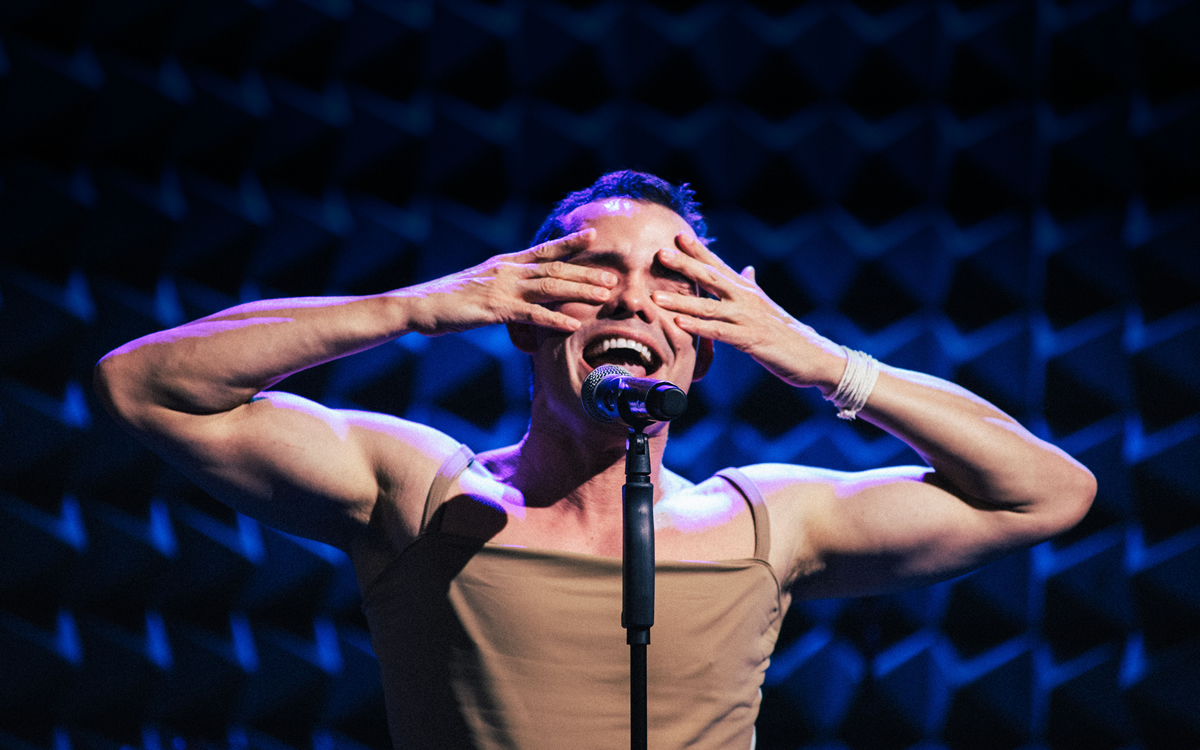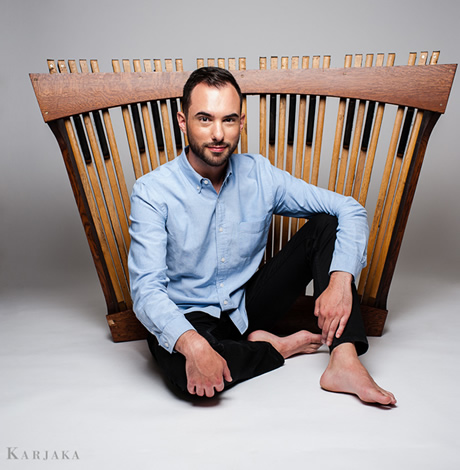Theater
GALA dance-theater piece tackles immigration
Gay performance artist debuts ‘English with an Accent’

‘English with an Accent’
April 1 (one night only)
GALA Theatre
3333 14th St., N.W.
$40
Galatheatre.org
When Venezuelan-born performance artist Migguel Anggelo immigrated to the states almost 17 years ago, he was frequently asked whether he spoke English. “I do, but with an accent” became his pat reply.
Grappling with a new language instantly became a part of his story. Acting and voice teachers advised him to lose the accent for a part in a show, but never for life. “Oh, I’ll have my accent forever, but I really can drop it when I need to,” he says breaking into a belle’s slow southern drawl followed by a whoop of laughter. “But it’s not easy.”
His latest show, aptly titled “English with an Accent,” references language but focuses mainly on the immigrant experience. Co-presented by Washington Performing Arts and GALA Hispanic Theatre for one night only on April 1 at GALA in Columbia Heights, the autobiographical hybrid dance-theater piece features Anggelo along with 10 international dancers selected for their talent and personal back stories in relation to migration.
Via phone from New York, the high-energy performer explains the genesis of his new work. The concept evolved during the darkest days of the pandemic when live performance was verboten. While working on what he thought would be his third album, he thought to himself, “If I change the order of the songs, this could be a compelling immigration story.”
“Immigrating is difficult. You leave a lot behind but you have to adapt,” he says. “When you first come to a country, they think of you as a worm or, more nicely, a caterpillar, but then when you succeed, suddenly you’re a butterfly. That’s a lot of what the show’s about.”
His music ranges from operatic to Latin mixed with tango to cumbia. At a little over an hour, the poignant yet funny piece has 13 songs (music and lyrics by Anggelo and Jaime Lozano), and when it’s not song, there’s lots of modern and contemporary movement. Its costumes subtly suggest anthropomorphized insects and the lighting design lends a cinematic affect.
Preternaturally busy, Anggelo’s varied vita boasts ballet, music, musical theater, painting, and Manhattan cabaret performances including his acclaimed gender-bending musical concert experience “LatinXoxo” in 2020. And now with “English with an Accent” he stretches himself further: “I’m doing a modern dance/ballet with song — we’re singing, dancing, and acting. Through my songs I tell the story, mine and the other caterpillars on stage.”
The last time Anggelo, 49, danced with an ensemble was 20 years ago during a Latin American tour of Broadway’s “Fame.” “I was a dancer before I was an actor and a singer. Still, I thought dancing like this again would kill me. Instead, I’m killing it.”
Growing up on the family farm in Venezuela, if Anggelo wanted milk, he looked for the cow.
“I was kind of like Heidi, the girl of the Alps, and very innocent. But I always knew what I was that I liked boys,” he continues. “I never had a good relationship with my father. He was very macho. Sometimes I’d describe a guy as beautiful and I’d be sent to my room without dinner. I never quite understood what I did wrong. But fortunately, his mother who now lives in Miami with his twin sister, supported him in all things, including boys.
His immigration journey began in earnest when he left Venezuela. “I’d been in Germany studying opera, and returned to find Hugo Chávez running the country. Friends told me he was a man of the people and that all would be well. Of course, that proved wrong. And his successor Madura is even worse. It’s a disaster.”
So Anggelo packed his bags and headed to Miami where he connected with an artists’ lawyer who helped him to obtain an 0-1 Visa for people with special talents in the arts, athletics, and sciences. Scrambling to find work and learning English by watching “The Golden Girls,” he adjusted to American life.
Now he lives in New York with his husband, event designer David Stark. He loves the city, and in fact, there’s a nod to Gotham in his show – a line from one of the songs reads, “I love to listen to the subway hum and watch the rats play with the trash.” Another song hilariously relates closer to D.C. It’s titled “Fat White House Clown.”
In 2020, Anggelo became a U.S. citizen. “It hasn’t been easy, but others have it much harder,” he says, empathizing with people who prefer to be illegal in America rather than hungry in their native country. “Immigrants are brave people.”
Theater
‘Bad Books’ a timely look at censorship in local library
Influencer vs. conservative parent in Round House production

‘Bad Books’
Through May 4
Round House Theatre
4545 East-West Highway
Bethesda, Md.
Tickets start at $43
Roundhousetheatre.org
While a library might seem an unlikely place for a heated contretemps, it’s exactly the spot where adults go when they’re itching to battle out what books minors might be allowed to read.
In Sharyn Rothstein’s “Bad Books,” two women, The Mother (out actor Holly Twyford) and The Librarian (Kate Eastwood Norris), swiftly become mired in a quarrel that comes with some weighty repercussions.
The Mother is a popular conservative influencer on a mission. She’s furious that the local library has overstepped its bounds and she blames The Librarian, a woman who adheres to the “it takes a village” method of child rearing and is dedicated to the young people who approach her reference desk.
There’s some background. It seems The Librarian who dresses young (tight jackets and Doc Martens) and curses a blue streak, forged a friendship with Jeremy, a teenage library regular.
While the details are a bit hazy, it seems the troubled Jeremy confided in The Librarian regarding some personal issues. In return, she suggested a helpful book – Boob Juice.
Unsurprisingly, based solely on its title, the book has thrown The Mother into a pique of outrage. After finding Boob Juice in her son’s bedroom, she made a beeline to the library; and not incidentally, The Mother hasn’t read the recommended work and has no plans to do so.
Set in a suburb with lax gun laws, the story explores facets of division and conciliation. The Mother insists she isn’t so much about banning books as she is keeping some books away from young people until they’ve obtained parental approval.
“Bad Books” is performed in the round. Built on a rotating stage, Meghan Raham’s set is simple, pleasingly serviceable, and easily transforms from the library into a small corporate office, and later the assembly room of a church. Overhead floats a circular glass shelf filled with a cache of banned books. Things like a rolling book cart and a goldfish bowl add some flavor to the different locations.
The Mother wasn’t always a popular conservative warrior with an enthusiastic horde of followers.
Her past includes penning a book that later filled her with guilt and regret. She refers to that early questionable literary accomplishment as her bad book. And while over the years, she has persevered to find and destroy each and every printed copy, she hasn’t entirely succeeded.
Norris plays three women who figure meaningfully into the arc of Twyford’s mother character. In addition to The Librarian, Norris is The Manager, a broadly played piece of comic relief, and The Editor, a warm woman who reveals things about Jeremy that his own mother never knew.
Smartly staged by Ryan Rilette, the production is part of a National New Play Network Rolling World Premiere. While Rothstein’s script offers two strong roles (skillfully performed by celebrated actors Twyford and Norris), its ending feels too neatly resolved.
In the past, Twyford and Norris have successfully joined forces for numerous DMV productions including Studio Theatre’s production of David Auburn’s two-hander “Summer, 1976,” the story of a longtime and unlikely friendship between two women who meet as young mothers during the Bicentennial summer.
Though different, both The Librarian and The Mother share a strong and ultimately hopeful relationship with words.
There’s a quote from E.B. White’s classic “Charlotte’s Web” that pops up a couple of times in the briskly paced 80-minute play. Charlotte, the wise spider, says, “with just the right words you can change the world.”

‘Uncle Vanya’
Through April 20
Shakespeare Theatre Company
Harman Hall
610 F St., N.W.
Shakespearetheatre.org
Shakespeare Theatre Company’s “Uncle Vanya” freshly rendered by director Simon Godwin and starring Hugh Bonneville in the title role, puts a pleasing twist on Chekhov’s tragicomic classic.
As disheveled, disheartened, and overworked Vanya, Bonneville is terrific. Though very different from the actor’s fame making role as Downton Abbey’s Lord Grantham, a proud, fastidiously turned-out aristocrat who presides over a manicured country estate peopled by a large staff, his Vanya is equally compelling
For “Uncle Vanya,” Chekhov imagines a house on a ragged estate in the Russian forest whose inhabitants display varying degrees of discontent brought on by the realization that they’re leading wasted lives. Middle-aged Vanya’s dissatisfaction and disappointment have been tempered by years of hard work. But all of that is about to be challenged.
With his plain and steadfast niece Sonya (Melanie Field), Vanya keeps the place going. And while barely putting aside a kopek for himself, he’s ensured that proceeds have gone to Sonya’s father Alexandre, a querulous academic (Tom Nelis), and his alluring, much younger second wife Yelena (Ito Aghayere) who live in the city.
When called to retire, the self-important professor and his wife economize by joining the family in the country. Overcome by the intense boredom brought on by provincial isolation, they’re not happy. Turns out, life in the sticks isn’t for them.
At the same time, the urban couple’s presence generates quite an effect on the rural household, changing the mood from one of regular work to idleness. What’s more, Vanya and family friend Mikhaíl Ástrov (John Benjamin Hickey), an unusually eco-aware, country doctor, are both bewitched by Yelena.
Meanwhile, young Sonya, who’s long carried an unrequited torch for Ástrov grows increasingly smitten. And while Yelena, who’s bored with her aging husband, expresses teasing tenderness with Vanya, she feels something more serious for Ástrov. It’s a whole lot for one house.
Superbly staged by Simon Godwin, STC’s artistic director, and performed by a topnotch cast, the very human production begins on an unfinished stage cluttered with costume racks and assorted props, all assembled by crew in black and actors in street clothes. We first see them arranging pillows and rugs for an outside scene. Throughout the play, the actors continue to assist with set changes accompanied by an underscore of melancholic cello strings.
With each subsequent scene, the work moves deeper into Chekhov’s late 19th century Russian world from the kitchen to the drawing room thanks in part to scenic designer Robert Brill’s subtle sets and Susan Hilferty and Heather C. Freedman’s period costumes as well as Jen Schriever’s emotive lighting design.
In moments of stillness, the set with its painterly muted tones and spare furnishings is a domestic interior from a moment in time. It’s really something.
Adapted by contemporary Irish playwright Conor McPherson, the work is infused with mordant wit, ribald comedy, and sadness. Like McPherson’s 2006 play “The Seafarer” in which the action unfolds among family, friends and others in a modest house filled with confrontation, laughter, resentment, and sadness. All on brand.
For much of “Uncle Vanya,” McPherson’s script leans into humor, funny slights, the professor’s pretentions, and Vanya’s delicious snarky asides; but after the interval, the play’s stakes become perilously heightened ready to explode with resentment and feelings of wasted potential, particularly frustrations expressed by Vanya and his intelligent but unfulfilled mother (Sharon Lockwood).
When it appears that mismatched couple Alexandre and Yelena are poised to depart, the house is struck with a sense of both relief and gloom.
Not everyone is disturbed. In fact, the family’s old nanny Nana (Nancy Robinette), and Waffles (Craig Wallace), a former landowner and now lodger on the estate, are elated. Both are eager to return to the pre-professor schedule of an early breakfast and midday lunch, and menus featuring simpler fare. They long for the return of the humble Russian noodle.
“Uncle Vanya”melds cynicism and hope. Like life, it’s a grasp at fulfillment.
Theater
Out actor Ángel Lozado on his new role in ‘In the Heights’
Lin-Manuel Miranda’s musical at Signature Theatre through May 4

‘In the Heights’
Through May 4
Signature Theatre
4200 Campbell Ave., Arlington, VA
Tickets start at $40
Sigtheatre.org
Before his smash hit “Hamilton” transformed Broadway, Lin-Manuel Miranda wrote “In the Heights,” a seminal musical set in an upper Manhattan barrio. Infused with hip-hop, rap, and pop ballads, the romance/dramedy unfolds over a lively few days in the well-known Latin neighborhood, Washington Heights.
Now playing at Signature Theatre in Arlington, “In the Heights” features handsome out actor Ángel Lozado as the show’s protagonist Usnavi de la Vega (named for a U.S. Navy vessel), a young Dominican American bodega owner who figures warmly in the center of the hood and the action.
A durable part that Lozado has wanted to play for some time, it’s proved the perfect vehicle to showcase his talents in a story that rings true to his heart.
WASHINGTON BLADE: Timing is very important to you.
ÁNGEL LOZADO: During rehearsal at Signature, our director James Vásquez said “In the Heights” finds you at a time when you need it. And that definitely resonates with me.
In the past I was up for Usnavi several times and then I was standby in the part for two weeks at the Muny in St. Louis but never called to go on.
And then, I lost my grandmother in January and was cast at Signature. In the show, the neighborhood loses their abuela [played by Rayanne Gonzales], I feel like I was meant to play the part at this moment. I’m a firm believer in the timing of it all.
BLADE: You’ve trained vocally at Florida State University, debuted on Broadway in “Bad Cinderella,” sang in “Jesus Christ Superstar Live (NBC),” and sung in many other musicals, but I’m guessing this is different?
LOZADO: Rapping is the most challenging part of the role. I’m trained in musical theater. I can sustain eight shows a week, but this is different. Rapping is more taxing. It’s challenging. With rap it’s clipped and the throat gets tighter.
BLADE: Like so much of Manhattan,Washington Heightshas changed a lot since 2008 when the show is set.
LOZADO: I currently live in Washington Heights and it’s very gentrified. Rents are high. I don’t think it was their intention to do a period piece but “In the Heights” is a period piece.
BLADE: And you grew up in Orlando, Fla., where before discovering theater, you were heavily into baseball.
LOZADO: I’m Puerto Rican, and baseball is a big part of our culture. My parents put me on a team at five, and I played first base through mid-high school. That was going to be a career. Went from one crazy career to another. When I got to high school, I was struggling with my queerness being in the sports world — struggled with my identity and the space I was in, I lost my love for baseball.
BLADE: How did you find your way to theater?
LOZADO: Through high school choir. It was a hard switch, but one that I couldn’t resist.
BLADE: You’ve been openly queer in the business. Has that ever been a problem?
LOZADO: I don’t know if it’s problematic or not. As actors, we don’t get behind the closed doors of casting. I do know that I’ve gotten to play lots of roles regionally that are straight men and that hasn’t been a problem.
Then again, I’ve cosplayed as a straight man most of my life. It makes me laugh when people see me offstage, they’re like, “Wow, you were really convincing as straight on stage.” I’ll take that compliment because that means I’m acting.
BLADE: Tell me about other roles you’ve played
LOZADO: Latin roles: Usnavi, Bernardo in “West Side Story,” Emilio Estefan in “On Your Feet!” and Che in “Evita.”And while I was thrilled to play those great parts, at the same time, I had friends getting auditions that weren’t specific to them being white, Black, or whatever. I worked with people who are more seasoned in the industry who had done 12 productions of “Evita.” I didn’t want to do that. I love representing my culture but I’d also like to do parts that have nothing to do with that. Dream roles include Sondheim’s “Sunday in the Park with George.”
BLADE: And how about a new work? Would you like creating a role on Broadway?
LOZADO: Oh yes, that’s the big dream.
BLADE: Do you think “In the Heights” might appeal to both Latin and queer audiences?
LOSADO: Yes.To see a people show themselves in a way that’s different from the stereotypes, telling our story in our own way, and not allowing the headlines define who we are, but to stand up in our joy.
“In the Heights” holds up the Latin community and, for me, that’s a parallel to the queer community, celebrating itself, especially in the upcoming time of WorldPride DC 2025 events (May 23-June 8).


















